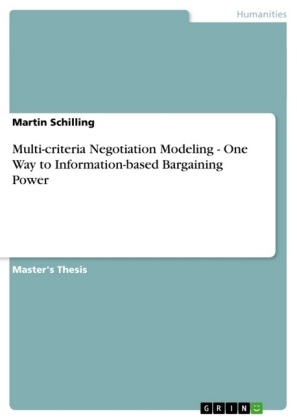Read more
Master's Thesis from the year 2003 in the subject Psychology - Work, Business, Organisational and Economic Psychology, grade: 1,6, London School of Economics, 56 entries in the bibliography, language: English, abstract: With this dissertation, the Multi-criteria Decision Modeling approach of the
LSE Decision Analysis Unit is transferred to negotiations. A new way to
model negotiations within a cost/benefit framework is introduced with a
fictive case-study.
Multi-criteria negotiation models belong to the class of Negotiation Support
Systems (NSS). Most applicable NSS up to date are web-based e-negotiation approaches and Group Negotiation Support Systems (GNSS), assisting teams of negotiators. Both approaches are reviewed. Due to the lack of flexibility and the high anonymity of web-based NSS, I view Group Negotiation Support Systems as more applicable to support real-world negotiators. With a process similar
to Decision Conferencing, this class of requisite models enables a team of negotiators to quantify their preferences. Consequently, higher-level perspective on negotiation strategies arise and differences of opinion within the team can be resolved.
Three distinct possibilities how multi-criteria GNSS can increase one partys bargaining power are identified. Each of them aim to increase the size of the available joint surplus and to claim most of this surplus. First, the model enables the negotiators to create a compensatory reservation zone, which raises the numbers of potential agreements. Reservation points are not defined as thresholds within each issue, but as an overall break-off value, allowing compensatory concessions across the
issues.
Second, a list of concession priorities can be generated to reveal concessions which are cheap to grant but valuable for the other side. Seemingly costly concessions can therefore be used as a powerful argument to elicit counter-concessions.
Third, during negotiati

